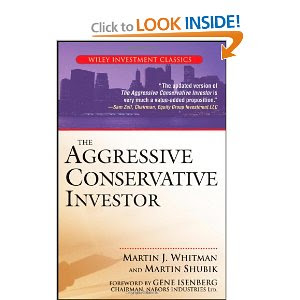Martin Whitman founded Third Avenue Value Fund some twenty years ago. Over that time period, the fund has beaten the returns of the S&P 500 by several points annually. In The Aggressive Conservative Investor, Whitman collaborates with Martin Shubik to discuss a concept that they call “safe and cheap” investing.
In this chapter, the authors discuss the importance of price performance to an investor. An argument is made that too many market participants put too great an emphasis on price performance, and not enough emphasis on business performance. But there are a number of reasons why a company’s short-term price and long-term business performance can diverge, including:
– changes in stock market levels
– changes in interest rates
– cyclical economic fluctuations
– quarterly (near-term) earnings performance
– dividend changes
The authors do, however, recognize that for some, price performance is of paramount importance. For example, traders who know nothing about the company’s business but who focus only on price volatility, trading volumes and previous price movements have no choice but to rely 100% on a security’s price movements in making their decisions. At the other extreme, those with a long-term outlook who have a deep knowledge and understanding of the underlying business’ value wouldn’t place much emphasis at all on the security’s price performance, opting instead to rely on their own valuations.
The authors also take issue with the general consensus that has developed with respect to the value that money managers add based on their short-term performance. Because many managers are beaten by the market after fees, it is generally accepted that these managers are useless. But the authors make the point that most managers have requirements such that “beating the market” is not part of, or only a small part of, their mandates. For example, the money manager at an insurance company should not be trying to outperform a bull market, but rather protect his business from being under-capitalized. Furthermore, statistically, even terrific money managers will be beaten by the market over several periods.




